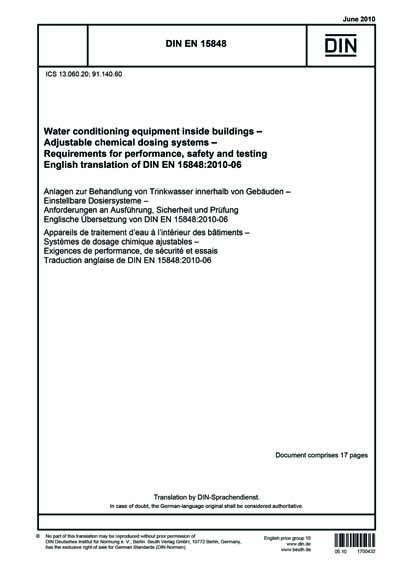Most recent
DIN EN 15848:2010
Water conditioning equipment inside buildings - Adjustable chemical dosing systems - Requirements for performance, safety and testing; German version EN 15848:2010
This standard specifies definitions, principles of construction (but not dimensions) and design, requirements on performance and operation as well as methods for testing the performance of adjustable chemical dosing systems for conditioning water intended for human consumption inside buildings which are permanently connected to the mains supply.*CEN/TC 164 "Water supply" has approved that in some European countries adjustable chemical dosing systems present on the European market have a high level of application in the mains supply. As a result CEN/TC 164/WG 13 "Water conditioning equipment inside buildings" has been assigned to develop a relevant product standard. This standard specifies definitions, principles of construction (but not dimensions) and design, requirements on performance and operation as well as methods for testing the performance of these adjustable chemical dosing systems for conditioning water intended for human consumption inside buildings. These systems are permanently connected to the mains supply at the point of entry of the water. In addition to the description of dosing system components, requirements are specified for materials of construction, venting, radio interference and electrical safety, accessibility, nominal sizes and activation of the manual mode, for example for maintenance. With regard to performance requirements for these systems specifications for chemicals and specific system components for protection against overdosing, as well as working temperature and pressure conditions have been defined. Testing these systems is primarily intended to check the compliance with the prescribed operating characteristics and the structural integrity of the system (pressure test). The labellingof these dosing systems serves both their correct use and the decisions to be taken on maintenance and repair. Since these systems involve complicated water conditioning equipment, aspects regarding installation, operation and maintenance have been explained in detail in a normative annex. A list with possible malfunctions and a troubleshooting guide have been incorporated for the event that problems occur with this dosing system. When using chemical dosing systems for water conditioning equipment inside buildings in accordance with this standard the current German Trinkwasserverordnung ("Drinking Water Regulations") and "Liste der Aufbereitungsstoffe und des Desinfektionsverfahren gemäß § 11 Trinkwasserverordnung 2001" ("List of conditioning materials and disinfection processes according to § 11 of Drinking Water Regulations 2001") shall be taken into account. Regarding the chemicals in drinking water they regulate amongst other things the following: the sole intended use, the maximumpermissible addition and regular checking of the concentration of chemicals, as well as the duty to notify consumers of the dosing. Since these national requirements are not sufficiently taken into account in this standard, the national Mirror Committee NA 119-04-17 AA "Wasserbehandlung" ("Water conditioning equipment") of NAW which is responsible for this standard does not recommend the use of adjustable dosing systems described in this standard.
Content Provider
Deutsches Institut für Normung [din]






